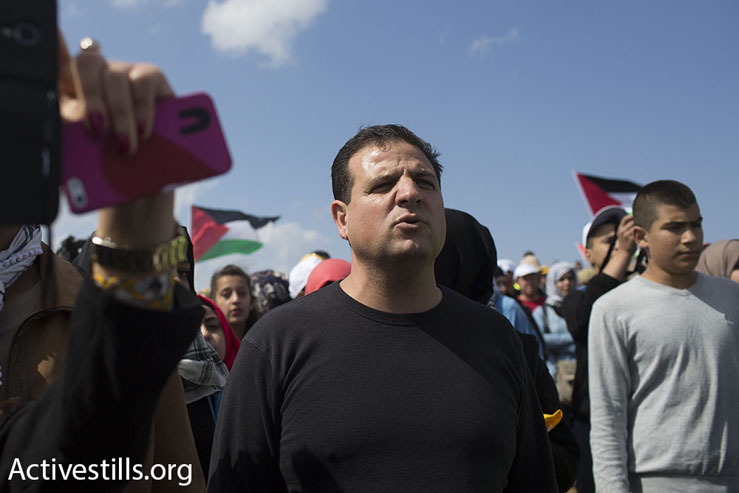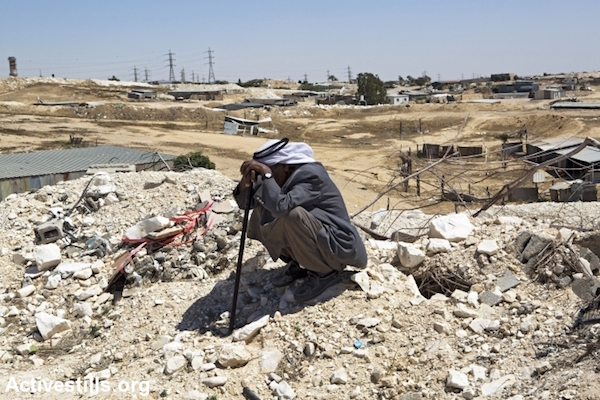
NEW YORK — “I believe in talking to everyone,” said Joint List leader Ayman Odeh. “In the Knesset, I speak with everyone.” He added, with a half smile, “Except [Avigdor] Lieberman. But that’s only because he refuses to speak to me.”
Odeh, a Palestinian citizen of Israel whose non-Zionist party is the third largest in the Knesset with 13 seats, is currently visiting Washington and New York for a series of meetings with diplomats, Jewish community leaders, journalists, think tanks and NGOs. But so far the only meeting that has been reported by Jewish media outlets is the one that controversially did not take place — at the New York office of the Conference of Presidents of Major Jewish Organizations.
Upon arriving Thursday morning at the organization’s midtown Manhattan building, Odeh discovered that the umbrella group shared its office with the Jewish Agency. The Agency is affiliated with Israel’s Ministry of Absorption and with the Jewish National Fund (JNF), which is involved in initiatives to displace Palestinians from their homes in favor of Jews.
Staffers for the umbrella group suggested moving the meeting to another office on a different floor in the same building — specifically, to the offices of the Reform Jewish Movement. But Executive Vice President Malcolm Hoenlein rejected the suggestion. He then sent out a press release in which he wrote that he was “deeply disturbed and shocked at the refusal” of Odeh to meet him.
“I did not refuse to meet him,” Odeh told +972. He emphasized that he had responded to an invitation from the Conference of Presidents — that he had not requested the meeting. He did not know until he arrived that the umbrella group shared an office with the Jewish Agency.
“I just asked if we could move the meeting to another room, but they refused. Instead of saying, okay, I understand your discomfort, and offering to meet me in another office, they did everything to make me uncomfortable.” Odeh noted that he made no public statement about the aborted meeting, except in response to the statement released immediately afterward by the Conference of Presidents.
The Jewish Agency’s mandate is to promote aliyah, or Jewish immigration to Israel. The JNF has, as reported extensively by +972, been directly involved in displacing Palestinian residents of East Jerusalem and the West Bank, as well as Palestinian citizens of Israel, in order to convert their land and homes into residences for Jewish citizens. In one particularly egregious case, the JNF has been involved in a project to reforest the “unrecognized” Bedouin village of Al Araqib in the Negev, which has been destroyed over 90 times — even as its residents, who have lived on the land for over a century, methodically rebuild each time the bulldozers depart.

Odeh, who spoke on Thursday evening at a private reception hosted by a Jewish Israeli ex-pat couple at their Upper West Side home, noted that he had by default met with more Jews than Arabs during his visit to the United States.
“I have actually found that Jewish Americans are more progressive than Jewish Israelis,” he said. “But the problem is with the leaders of the community. They want to tell me how to behave and what to think, to impose their views on me and tell me what I should say. I cannot accept that.”
Speaking in Hebrew during a conversation with +972 that took place Friday morning in Manhattan, the Joint List leader noted that he was not a member of Israel’s governing coalition. He was visiting the United States as the elected representative of Israel’s Arab citizens. Paraphrasing the statement he had given earlier in response to the press release from the Conference of Presidents, Odeh underlined that his party also refrained from involvement in ministries that pursued mandates favoring Jewish citizens at the expense of the state’s Arab citizens — specifically the Ministry of Defense, the Foreign Ministry, and the Ministry of Aliyah and Immigrant Absorption.
Odeh spoke passionately about his vision for the state of Israel as a place where all citizens, Arabs and Jews, had equal rights in every sphere. He understands that many Jews feel threatened by the idea of seeing their state become a place not defined by its Jewishness but as a state of all its citizens.
“I absolutely acknowledge the Jewish right to self determination!” he said vehemently. “But I am also committed to achieving complete equality for all citizens, regardless of religion or creed.”
The quasi-governmental Jewish Agency boasts about having contributed to the building of over one thousand residential communities for Jews in the State of Israel. But no Israeli government since 1948 has allotted land for a single new town or village for its Arab citizens, who comprise 20 percent of Israel’s population, even as the government imposes severe restrictions on the acquisition of building permits in Arab-majority areas. As a result, Israel’s Arab “villages” are actually densely populated towns and small cities that lack the basic amenities and infrastructure taken for granted in Jewish towns the same size or even smaller.
Odeh asked rhetorically, “What’s the problem with building new villages where our old villages were in 1948? All I see is concrete where our villages were. We’ve lost the naiveté of village culture, but we haven’t replaced it with cosmopolitan urban life — with cafes and places of culture. I just want someone to convince me that this will hurt the Jews. It is actually in the best interest of the Jewish citizens for us to live in a state of equality.”
“I am sorry,” he continued, “if this sounds naïve. But I love both peoples. I am expressing my very frank and honest desire to build a joint and equal society. And unfortunately that desire threatens the hegemony.”
In response to a question regarding his vision of Israel in 10 years, Odeh described a “democratic state with full equality for all, social justice, an economy not controlled by tycoons, a bilingual population speaking Hebrew and Arabic and a more responsible attitude to environmental issues.”
Toward the end of the interview, Odeh suddenly recited from memory “I Believe,” a famous poem composed at the end of the nineteenth century by the great Hebrew poet Shaul Tchernichovsky. He emphasized one stanza in particular:
Laugh for I believe in friendship/That a spirit I’ll find, a kindred heart/To share my hopes and share my joys/Compassion ever willing to impart.
“Listen to those words!” he said. “Amazing.”
“So if I know Hebrew poetry and appreciate Jewish history and understand their pain and the Shoah, then I want them to understand our history and our narrative and pain.”


